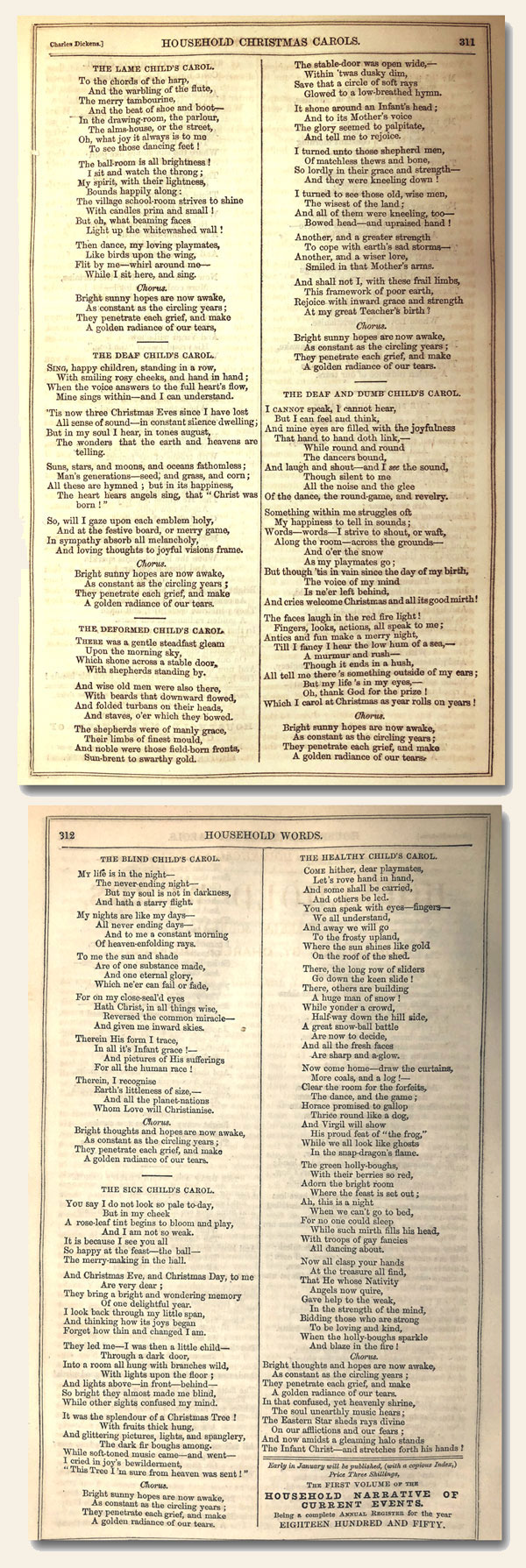Great Story Telling is Essential to Life… Hans Christian Anderson’s Mastery of Creating the Fairytale…
April 8, 2024 by Laura Heilenman · Leave a Comment
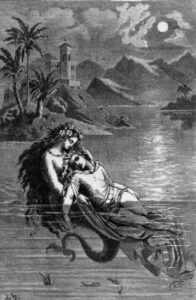 Some experiences transcend generations and ages, capturing the imaginations and hearts of both mother and daughter, grandfather and grandson. Often these moments come via a well-written narrative. The idea of being enraptured by a story to the point where reality fades away can be experienced by reading the tales “Scheherazade” spun or the fairy tales created by The Grimm Brothers. Such stories could have begun as follows: “On a cool spring evening, in a tiny hamlet, deep in countryside of Denmark, a small lad was born who would grow to bring magic and delight to people of all ages.” In fact, on April 2, 1805, this fictional beginning became a reality with the birth of Hans Christian Anderson. Undeniably one of the great storytellers of all time, his works would be told, retold and reimagined for every generation since they were penned – capturing the curiosity of children and adults alike.
Some experiences transcend generations and ages, capturing the imaginations and hearts of both mother and daughter, grandfather and grandson. Often these moments come via a well-written narrative. The idea of being enraptured by a story to the point where reality fades away can be experienced by reading the tales “Scheherazade” spun or the fairy tales created by The Grimm Brothers. Such stories could have begun as follows: “On a cool spring evening, in a tiny hamlet, deep in countryside of Denmark, a small lad was born who would grow to bring magic and delight to people of all ages.” In fact, on April 2, 1805, this fictional beginning became a reality with the birth of Hans Christian Anderson. Undeniably one of the great storytellers of all time, his works would be told, retold and reimagined for every generation since they were penned – capturing the curiosity of children and adults alike.
Here, in the 21st Century, I often hear complaints concerning the lack of (quality) storytelling which mesmerizes the viewer or reader and allows the darker, heavier parts of life to fall away – enrapturing and encouraging the reader/listener by what is good and beautiful and true… traits which spur us on to be our better selves. These are the stories we need today, and if truth be told, everyday. Let us all hope & pray that exceptional storytelling is not a dead art. Thankfully, till it resurfaces in abundance, we can always enjoy the gems of the past.
“Yes, Virginia, there is a Santa Claus”…
December 13, 2023 by GuyHeilenman · Leave a Comment
The world-famous article shown below appeared in THE (New York) SUN on September 21, 1897. It is certainly one of the most challenging issues to collect as few are known to exist. It has been said this may very well be the most recognized editorial of all time. Found on page 6 and headed: “Is There a Santa Claus?”, this is the famous “Yes, Virginia, there is a Santa Claus” editorial written by Francis Pharcellus Church, a sardonic Columbia College graduate & veteran Sun writer, he produced a masterpiece in fewer than 500 words.
Although the letter from Virginia and the famous response by Church have become well known (translated into 20 languages), few would know the prefacing paragraph which immediately precedes Virginia’s letter: “We take pleasure in answering at once and thus prominently the communication below, expressing at the same time our great gratification that its faithful author is numbered among the friends of The Sun:…” and then Virginia’s letter and Church’s response.
The famous phrase “Yes, Virginia, there is a Santa Claus…” begins the second paragraph, and the letter closes with: “…No Santa Claus! Thank God! he lives, and he lives forever. A thousand years from now, Virginia, nay, ten times ten thousand years from now, he will continue to make glad the heart of childhood.”
The press tracked Virginia until her retirement as a 70-year-old school teacher, while Church remained anonymous as the author until his death in 1906.
As for Church, he was a hardened cynic and an atheist who had little patience for superstitious beliefs, did not want to write the editorial, and refused to allow his name to be attached to the piece. More than a century later, it is the most reprinted editorial in any newspaper in the English language. This reality is a great reminder to all of us to always give our best effort, even when we don’t necessarily agree with those whom are in authority over us – moral conflicts accepted.
So, for a few brief moments let’s set aside the weight of “enlightenment” which is pressed upon us by virtue of adulthood and attempt to appreciate the sweet exchange between a “cynical” journalist and a curious, yet innocent, young girl. Merry Christmas and Happy Holidays to ALL!
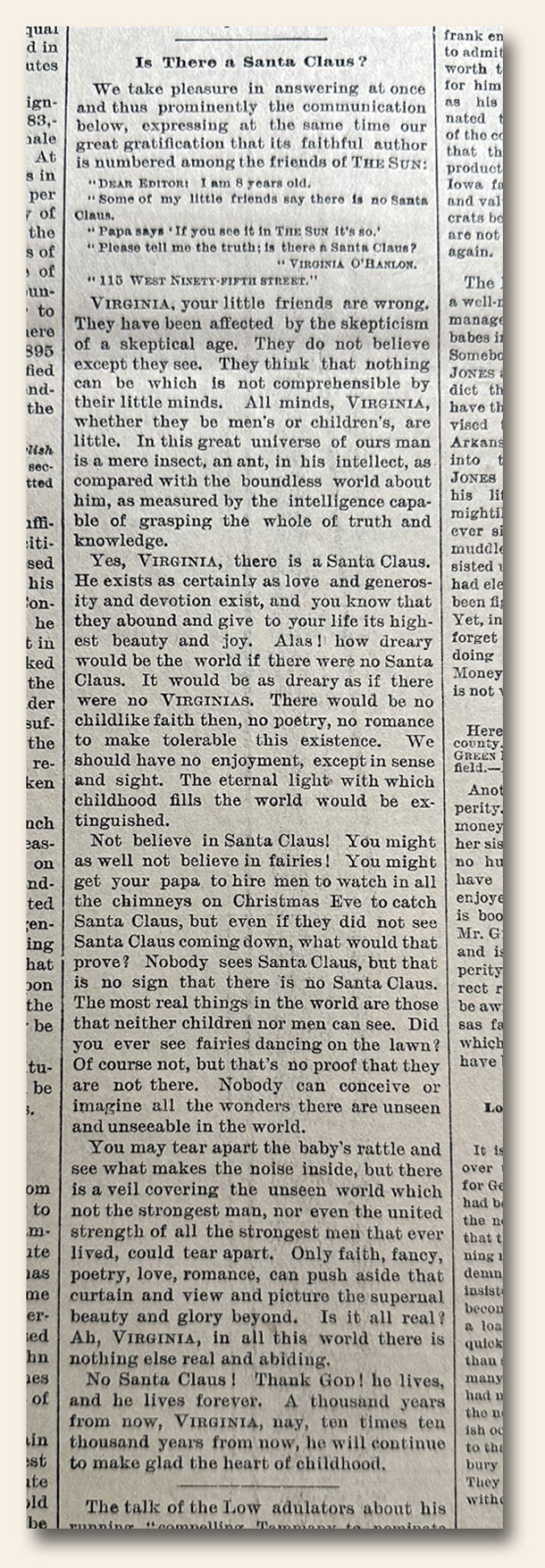
“Uncle Tom’s Cabin” – impacting The Senate and The South (1853)…
September 4, 2023 by GuyHeilenman · Leave a Comment
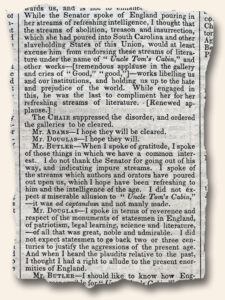 Few can argue against the claim of Harriet Beecher’s Stowe’s “Uncle Tom’ Cabin“ being one of the most influential books upon the 19th century… and beyond. However, many incorrectly believe the impact to have been largely upon America alone, but the reality is many European countries felt its sting long before its role in codifying anti-slavery sentiment within the United States. Scanning through newspaper reports from the early 1850’s dramatically reveal the initial polar-opposite reactions regarding its influence.
Few can argue against the claim of Harriet Beecher’s Stowe’s “Uncle Tom’ Cabin“ being one of the most influential books upon the 19th century… and beyond. However, many incorrectly believe the impact to have been largely upon America alone, but the reality is many European countries felt its sting long before its role in codifying anti-slavery sentiment within the United States. Scanning through newspaper reports from the early 1850’s dramatically reveal the initial polar-opposite reactions regarding its influence.
One such newspaper was the Mach 17, 1863 issue of the New-York Daily Times. The front page provides the text (except shown to the right) of the previous day’s debate on the floor of the Senate in which one senator refers its impact on England as a positive validation for his point, while another senator takes the reference to be an unjustified, gross, “miserable” insult. For those who were beginning to sense the foundation of slavery beginning to crumble, this novel would prove to be a thorn in their side for years to come.
Ironically, in case one wonders if the culture of the 1850’s was ripe for the demise of slavery, page two has a lengthy discussion on the impact of both slave and free labor on Southern Agriculture Prosperity – an excerpt which is shown below. One of the fun things about the relationship between this incredible novel and historic newspapers is that it was 1st printed in serialized form in The National Era, a newspaper out of Washington, D.C..
Snapshot 1822 – Before the last Mohican tugged at our heartstrings…
August 4, 2022 by GuyHeilenman · Leave a Comment
When one thinks of James Fenimore Cooper they no doubt think of his classic novel, “The Last of the Mohicans” – an extraordinarily compelling account (albeit fictional) of the attack on Fort William Henry during the French and Indian War. However, somewhat lost over time is his highly respected work from 5 years prior which brought him national attention and respect as an American novelist: “The Spy” (another work of historical fiction but set during the American Revolution). While still early in his career, the Feb. 2, 1922 Columbian Centinel had a nice report announcing its release and included a mention of “coming attractions”. It also made reference to his deceased father, a former New York State Judge and Senator. Although not mentioned in the article, the reading of it inspired me to do a little digging at which point I discovered his boyhood home was in the village of Cooperstown, New York, which had been named after his family.
The more things change… Vaccinations and the immoral influences on children…
February 15, 2022 by Stephanie Williams · Leave a Comment
Currently, the whole world over is speaking of virus and antibodies, of carriers and immunization. Outbreaks are mapped in news blurbs, along with identified hot spots and constant status reports on flattening the curve. Comparisons are made to the “Spanish Flu”, but an article in a September, 1808 issue of The Gentleman’s Magazine led me to comparisons with smallpox instead. More specifically, they led me to the smallpox outbreak that eventually brought Edward Jenner into focus — he of the cowpox vaccination fame (or, infamy, as critics would have it).
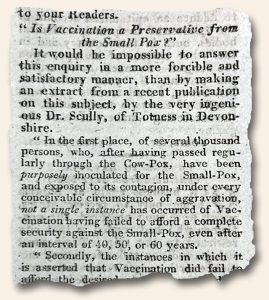 The mannerly Gentleman’s employs an ambitious article heading as it delves into the fray: “Practice of Vaccination Dispassionately Discussed.” As the Reverend Cotton Mather discovered in 1721, there is much passion involved in the subject. He, who pleaded for the adoption of the African method of inoculation to save the afflicted residents of Boston, was the object of threats and the target of a bombing. The periodical contributor, pen named “Cosmopolitan,” attempts a scholarly address of the merits just twelve years after Edward Jenner formalized the medical application of a controlled injection of the cowpox virus in order to immunize a human body against smallpox, which was disfiguring and killing people by the thousands.
The mannerly Gentleman’s employs an ambitious article heading as it delves into the fray: “Practice of Vaccination Dispassionately Discussed.” As the Reverend Cotton Mather discovered in 1721, there is much passion involved in the subject. He, who pleaded for the adoption of the African method of inoculation to save the afflicted residents of Boston, was the object of threats and the target of a bombing. The periodical contributor, pen named “Cosmopolitan,” attempts a scholarly address of the merits just twelve years after Edward Jenner formalized the medical application of a controlled injection of the cowpox virus in order to immunize a human body against smallpox, which was disfiguring and killing people by the thousands.
After Mr. Cosmopolitan completes his summary of the beneficial relationship between the vaccine and the decreased virus contraction rate, he promises the editor, Mr. Urban, that as the science may not be completely convincing to all, he is prepared to offer testimonials in the next issue.
I was able to locate the fulfillment of that pledge in the October issue.
The facts which were there mentioned, must of themselves be nearly sufficient to convince an unprejudiced observer of the efficacy of the Vaccine preservative. It now remains to take an impartial review of the remaining part of the evidence on this interesting topick, which may be gathered from the experience of eminent individuals and from the avowed opinion of public bodies.
These are the same methods employed today about the still-controversial procedure of immunization — presentation of scientific data, followed by explanation of that data from medical professionals, and the promotion or recommendation of the practice by public officials. For the Coronavirus of today, the vaccine has not even been developed, and the debate is already heated.
PS This issue also has an article regarding juveniles obtaining access to “age-inappropriate literature” through libraries. Two current topics which reach back to the early 1800’s: “The more things change…”.
Nostalgia inspired by a Great Storyteller…
December 6, 2021 by Laura Heilenman · Leave a Comment
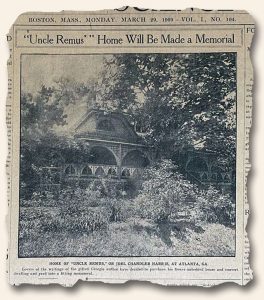 The other day I read a quote by someone who asked, “Is it wrong to be nostalgic for a time before you were born?” I may have actually whispered “Hmmm” to myself as I pondered the question. The truth is, when you are surrounded daily by newspapers which tell of events from years long before you were born, one finds oneself bouncing back and forth between a sense of nostalgia and relief – pining after a day when life was a bit slower and less complicated, and moments later being thankful for not having lived through some of the greatest horrors humanity has endured.
The other day I read a quote by someone who asked, “Is it wrong to be nostalgic for a time before you were born?” I may have actually whispered “Hmmm” to myself as I pondered the question. The truth is, when you are surrounded daily by newspapers which tell of events from years long before you were born, one finds oneself bouncing back and forth between a sense of nostalgia and relief – pining after a day when life was a bit slower and less complicated, and moments later being thankful for not having lived through some of the greatest horrors humanity has endured.
Today the scale tipped to nostalgia as I was scanning an issue of The Christian Science Monitor for March 29, 1909 and came across an article featuring an author who’s children’s stories brought me as much delight as a child as they did children of his day. Joel Chandler Harris had the gift of story telling and teaching important lessons to his readers of all ages. Sometimes a sense of nostalgia can reach back decades or even centuries.
Louisa May Alcott – a sad, but poetic death…
November 22, 2021 by Stephanie Williams · Leave a Comment
Today I found a gem as I was sorting through some volumes from the late 19th century. While this one might not have broad appeal, it was the highlight of my archive adventures. Within The Woman’s Journal dated March 10, 1888 is following editorial note by Lucy Stone:
To the editors of the WOMAN’s JOURNAL the death of Miss Alcott comes with a sense of personal bereavement. From the beginning she was a steadfast friend of the suffrage cause. She was always ready to serve it. Her cordial endorsement of it in many letters sent to be read at suffrage conventions, her repeated reaffirmation of her increasing conviction of the need of woman suffrage has been again and again like a tower of strength, or like the shadow of a great rock in a weary land. Millions of people on both sides of the ocean, whose lives her pen has enriched and made better, will hear with pain and sorrow of her untimely death.
From her home state newspaper, to which she was a regular subscriber, the details of her life and sudden departure from it are particularly poignant: “It is difficult, within the limits of an obituary notice, to do justice to a genius so rare and a character so lovely,” writes one contributor. However, the anecdotes and details that fill the paper attempt to do just that as they chronicle her life, her career, and the many efforts to enrich the lives of those around her. The author of Little Women, Little Men, Eight Cousins and so many other popular titles, became sick while visiting her father, Amos Bronson Alcott — the Transcendentalist teacher, writer, woman’s suffrage advocate and philosopher. To him, while a mere breath removed from her last, Louisa wrote, “Surely dear father some good angel or elf dropped a talisman in your cradle that gave you force to walk thro life in quiet sunshine while others groped in the dark…”.
Sadly, it was on the morning of his funeral that she passed away. Following the obituary for her father, the three-column tribute to the beloved author begins with a statement that is heart wrenching in its simplicity.
“Louisa May Alcott is no more.”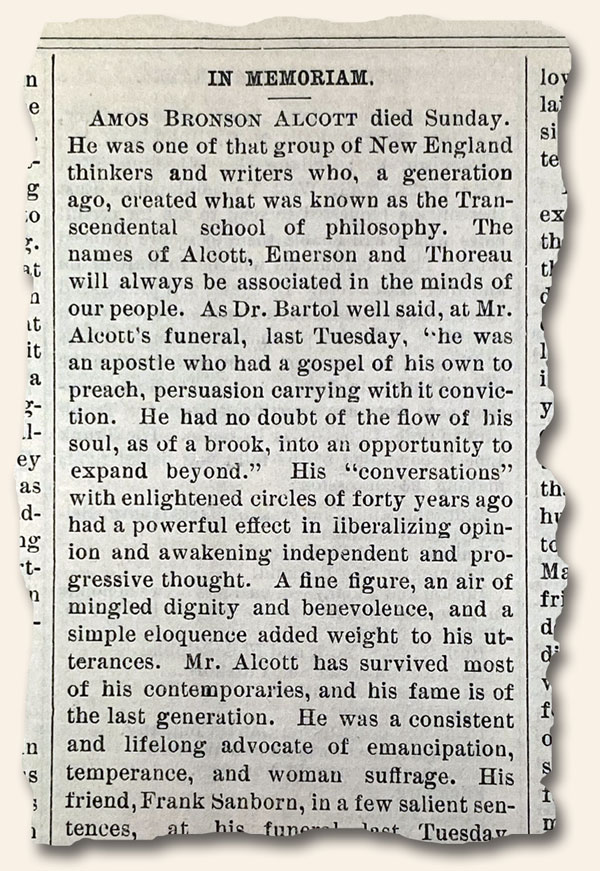
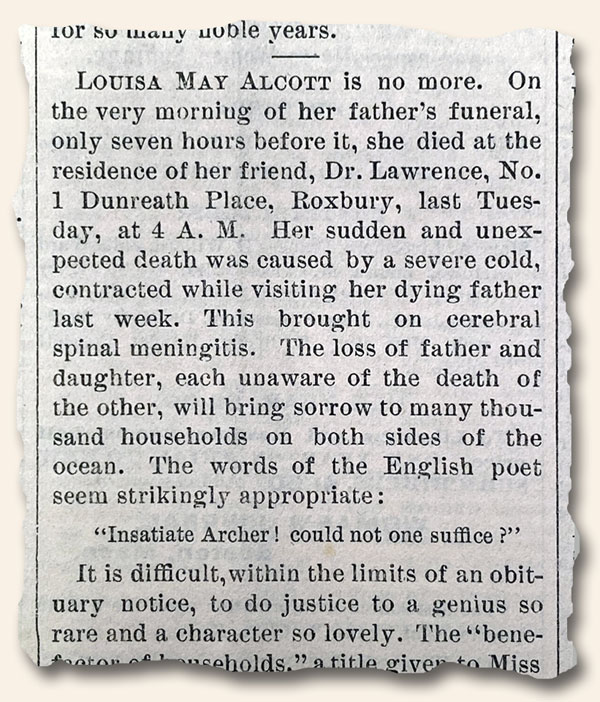
Master Wordsmiths Often 1st Shared Their Treasures in Newspapers…
April 12, 2021 by Laura Heilenman · Leave a Comment
What do Walt Whitman (poet extraordinaire) … Joel Chandler Harris (Uncle Remus fame) … Charles Dickens (needs no introduction) all have in common? Perhaps my title gave the answer away. These and many other authors often shared their literary master pieces in newspapers before they were printed in book form. Recently, as I was delving into some San Francisco Chronicles, I came upon another addition to this illustrious list. Warm welcomes to Dame Agatha Mary Clarissa Christie, Lady Mallowan. On September 3, 1939, the San Francisco Chronicle, This Week Magazine section began a “thrilling series of short mystery stories” by Agatha Christie. This 1st story in the series “The Labours of Hercules” was titled “Invisible Enemy”. By putting such variety of writing into a public newspaper, the everyday person was often exposed to quality literature giving them the opportunity to increase their education in a casual way. Thanks to these master story tellers for sharing with all of us.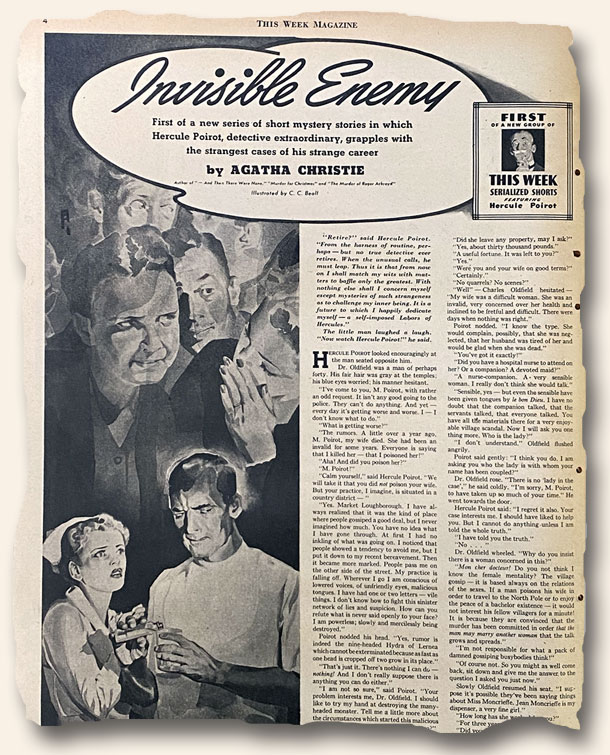
Snapshot 1966… Cancel culture, free speech, and a civil society…
November 9, 2020 by GuyHeilenman · Leave a Comment
What to cancel vs. what to keep? Revisionism vs. an accurate accounting?
The practice of what we currently refer to as “Cancel Culture” is nothing new. Few details remain of China’s glorious early history due to the practice of each new dynasty expunging any evidence regarding the former so-as to elevate itself to the top of the historical record. Other religions and societies have done the same in order to eliminate the warts which are common to all. While some believe it is important to remember history, no matter how ugly, in the hope that future generations will learn from past mistakes, others are convinced the past is too painful, and must therefore be eradicated from wherever it might rear its ugly head.
Although statues, flags, and other symbols have been the most recent targets of this tension, the written word was the most common target of past generations, and was realized through both the banning and burning of books which were deemed too immoral, too painful, or too revealing of “whatever we currently don’t want to be known” to be read. Examples include Uncle Tom’s Cabin, 1984, Animal Farm, Brave New World, and the feature of this post, To Kill A Mocking Bird. Published in 1966 to overwhelming critical approval, it wasn’t too long before it began to receive considerable resistance for a plethora of objections, and although included on many high school and junior high school reading lists, attempts to remove it from school libraries were quite common. The article below highlights one such a case, with the New York Times of January 16, 1966 printing Harper Lee’s own response to a local schoolboard near Richmond, Virginia.
The purpose of this post is not to resolve the issues created by both free speech and revisionism; rather, to merely ponder these issues in light of the past. My only editorial contribution is that I’m glad I can still look back at such accounts as printed in old newspapers and hopefully glean perspective on how and where I’d like to tread in the present. 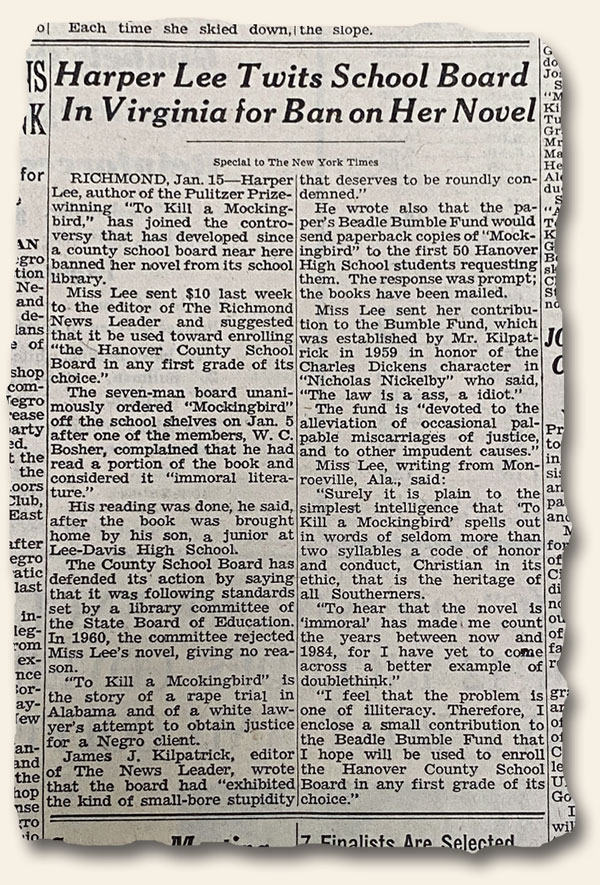
Christmas-themed poems from 1850 – Food for thought…
December 24, 2019 by GuyHeilenman · Leave a Comment
Earlier this year I came across a December 21, 1850 issue of Household Words – a publication “conducted” by Charles Dickens, which actually contained an original work by him titled “A CHRISTMAS TREE.” Although this was his publication, the majority of the contributions within were typically written by others. While perusing the issue I came across a set of Christmas-themed poems which stirred my heart. Hopefully you will also find them moving. Enjoy.